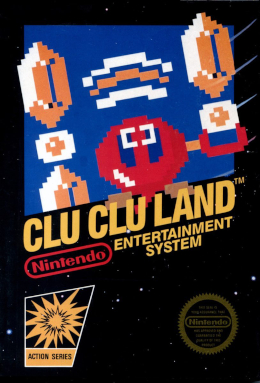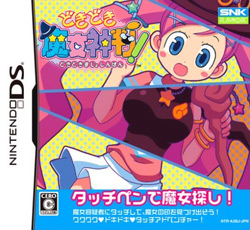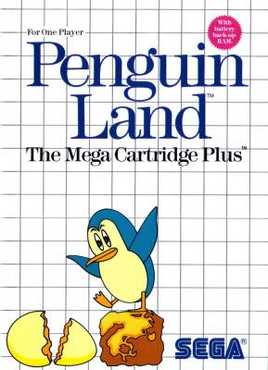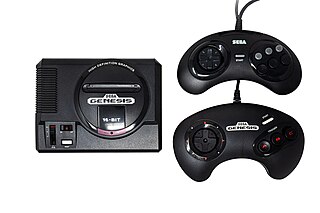
Puzzle video games make up a broad genre of video games that emphasize puzzle solving. The types of puzzles can test problem-solving skills, including logic, pattern recognition, sequence solving, spatial recognition, and word completion. Many puzzle games involve a real-time element and require quick thinking, such as Tetris (1985) and Lemmings (1991).

A platformer is a sub-genre of action video games in which the core objective is to move the player character between points in an environment. Platform games are characterized by levels with uneven terrain and suspended platforms of varying height that require jumping and climbing to traverse. Other acrobatic maneuvers may factor into the gameplay, such as swinging from vines or grappling hooks, jumping off walls, gliding through the air, or bouncing from springboards or trampolines.

Clu Clu Land is a puzzle video game developed and published by Nintendo in 1984 in Japan for the Famicom. It was released in North America in 1985 as a Nintendo Entertainment System launch game and in Europe in 1987. Nintendo has rereleased it many times via emulation.

Flicky is a platform game developed by Sega and released as an arcade video game in May 1984. It was licensed to Bally Midway for distribution in the United States. In Flicky, the player controls the eponymous blue bird and must gather all the small birds called Chirps in each round and bring them safely to the exit. There are cat and lizard enemies which can disperse the Chirps and kill the player, but Flicky can use items on the playing field to protect herself and the Chirps from danger.

Sega Ninja, originally released as Ninja Princess in Japan, is a run and gun video game released in arcades by Sega in 1985. The game features Princess Kurumi, the titular female ninja, battling enemies using throwing knives and throwing stars. The game was originally released in arcades as Ninja Princess in Japan and Sega Ninja internationally. In contrast to most later games in the genre, Ninja Princess has a feudal Japan setting with a female ninja protagonist who throws shuriken and knives.

KID was a Japan-based company specializing in porting and developing bishōjo games.

Binary Land is a puzzle video game developed by Hudson Soft in 1983 for the MSX, FM-7, PC-6001mkII, NEC PC-8801, Sharp MZ-2200, Sharp MZ-5500, Sharp X1 and in 1985 for the Famicom. The MSX version saw release in Japan by Hudson Soft and in Europe by Kuma Computers Ltd in 1984.

McDonald's Treasure Land Adventure is a 1993 platform game developed by Treasure and published by Sega for the Sega Genesis. Based on the McDonald's fast food restaurant chain, specifically its McDonaldland marketing campaign, players control Ronald McDonald in his efforts to retrieve the missing pieces of a map that lead to the location of a buried treasure from a group of villains. Ronald can defeat enemies by using a magic attack and can latch onto hooks with his scarf to reach higher platforms.

Gley Lancer is a 1992 scrolling shooter video game originally developed by NCS Corporation, published in Japan by Masaya and in South Korea by Samsung for the Sega Mega Drive/Genesis. It was re-released in 2019 by Japanese publisher Columbus Circle. It follows Lucia Cabrock, daughter of Earth Federation Navy admiral Ken, who disappeared while fighting in a war between humans and an unknown alien race that possess the ability to teleport, joined by her friend Teim on a journey to save her father by stealing a starfighter. Controlling the titular fighter ship, the player must fight waves of enemies and bosses, while avoiding collision with their projectiles and other obstacles. The Gley Lancer ship is equipped with two satellites options, whose positions and formations are determined by the player.

Tommy Lasorda Baseball is a 1989 baseball video game developed and published by Sega as one of the six launch titles for the Sega Genesis in the North America and for the Sega Mega-Tech arcade system. It is a follow-up to the arcade game Super League (1987). It prominently features former MLB player Tommy Lasorda, who was manager of the Los Angeles Dodgers at the time. In the game, players compete with either AI-controlled opponents or against other players across single exhibitions, open matches or a 30-game season.

Doki Doki Majo Shinpan! is a video game developed by SNK Playmore for Nintendo DS. The player assumes the role of a junior high school student who is asked by an angel to locate a witch that has snuck into his school. In order to find the witch, he must search the suspects' bodies for a "witch mark." The preferred method is by using touch. A sequel titled Doki Doki Majo Shinpan 2 Duo was released 31 July 2008, and a third game titled Doki Majo Plus was released on July 30, 2009.

Monaco GP is an arcade racing game released by Sega in November 1979 in Japan, and January 1980 worldwide. An upgraded version, Pro Monaco GP, was released later in 1980. One of the last Sega games to use TTL chips instead of a microprocessor CPU, the game has players race against a clock and pass rival racers while attempting to earn points driving through five areas.

Penguin Land, known as Doki Doki Penguin Land Uchū Daibōken in Japan, is a 1987 puzzle-platform game published and developed by Sega for the Master System. It is the second game in the Doki Doki Penguin Land series. The player controls a penguin to guide an egg around polar bears, rocks and other hazards. There are 50 stages and a level editor which can save up to 15 additional levels. The level editor data is stored on the game's battery back-up RAM. Penguin Land was the first home console video game to include a battery backup save feature being released four days prior to The Legend of Zelda in the US.
Hisao Oguchi is a Japanese business executive. He was director, vice chairman, and chief creative officer of Sega Sammy Holdings Inc. Oguchi originally was President and CEO of Sega. He was president and CEO of Sega Sammy Creation. He is currently a director of UDream, a content production company.

Duck Maze is a puzzle-platform game developed and published by Bit Corporation in 1987. The title was later published in 1990 by HES and Dismac, respectively in Australia and Brazil.
The Sega Card, known in Japan as Sega My Card, is a memory card format used as game storage for the SG-1000/SC-3000 and the Mark III / Master System. Produced from 1985 to 1987 by Mitsubishi Plastics, the cards are plugged into onboard cardslots or into compatible adapters. Several versions of the format were created, including a rewritable one that allows new titles to be downloaded to a card. While substantially cheaper to produce than cartridges, the storage limitations of the format resulted in Sega exclusively distributing games on cartridges. Despite the failure of the Sega Card, NEC found more success with its own memory card format, the HuCard, which was the primary storage medium for its PC Engine game console.

Illusion, known in Japan as I Love Mickey Mouse, is a series of platforming video games developed and published by Sega for its consoles Master System, Sega Genesis and Game Gear. The series follows the adventures of Disney's cartoon character Mickey Mouse between various fantasy worlds. The series includes Castle of Illusion, and its sequels Land of Illusion, World of Illusion and Legend of Illusion.

Star Cruiser is a role-playing first-person shooter video game developed by Arsys Software and released in Japan for the PC-8801 and X1 home computers in 1988. The game was released for the PC-9801 and X68000 computers in 1989, and then ported by Masaya (NCS) to the Mega Drive in 1990.
Ultracore is a run and gun video game developed by DICE. Originally due to be released for Amiga, Genesis, and Sega CD platforms, the game was canceled by its publisher, Psygnosis, in 1994 after it had been almost finished. The game was salvaged by publisher Strictly Limited Games and released together with the Mega Sg aftermarket console in March 2019. Ports for Nintendo Switch, PlayStation 4, and PlayStation Vita were released in 2020. A version compatible with original Sega Genesis systems was released in Japan in October 2019. Ports for Xbox One and Xbox Series X/S were released in December 2023.

The Sega Genesis Mini, known as the Mega Drive Mini in regions outside of North America, is a dedicated console modeled on the Sega Genesis. The Mini emulates the original console's 16-bit hardware, and includes 42 games made available through emulation software by M2. It was released in North America and Japan in September 2019 and in Europe and the Middle East in October 2019. A follow-up, Sega Genesis Mini 2, was released in October 2022 and includes 60 games from the Genesis and Sega CD.
















